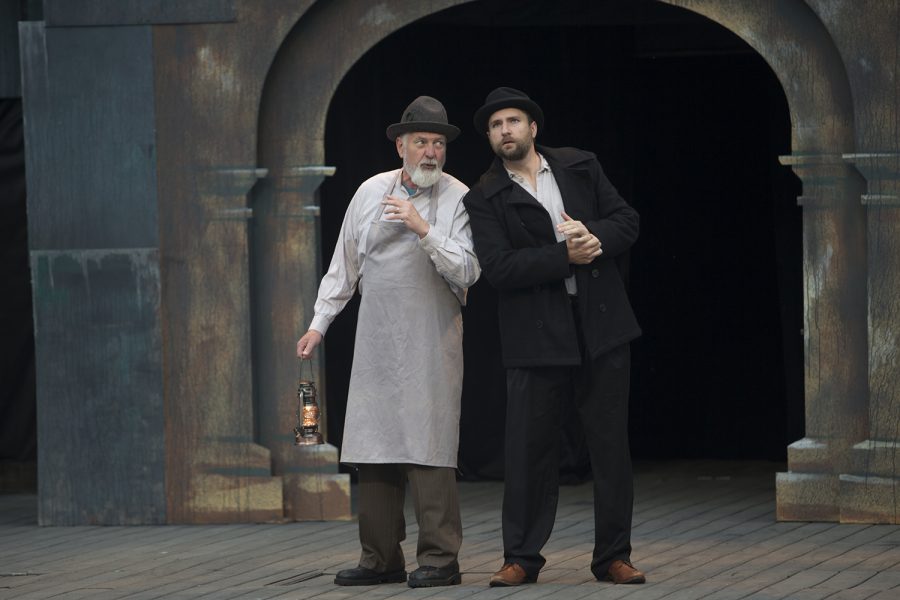Riverside Theater brings Henry IV to the stage
Riverside Theater brings one of the Bard’s most famous plays to the stage with a few interesting twists.
Actors perform on stage during a performance of William Shakespeare’s *King Henry IV Part I* on Sunday, June 16, 2019 at City Park in Iowa City. (Emily Wangen/The Daily Iowan)
June 17, 2019
The clouds above you, the wind whispering through the audience, and a stage set for the famous Bard’s play. Iowa City’s own Riverside Theater will present Henry IV free to the public this week.
Shakespeare’s Henry IV will run on June 20, 21, 22, and 23 at 7:30 p.m. in Lower City Park (location will change in case of poor weather).
Shakespeare’s histories can get dismissed by some as being boring or drab, but for Director Adam Knight, they are everything but that.
“Finding something that had a mixture of comedy and drama was really important to me,” he said. “Henry IV has one of the funniest characters in all of Shakespeare, Falstaff. This play has mixture of action, comedy, and drama in a way that is so wonderful in Shakespeare.”
The play follows King Henry IV’s son Prince Hal and his friend Falstaff in their tavern adventures, while the king’s former ally, Hotspur, builds a rebellion. The play then causes the prince to learn what it means to be both a leader and an adult.
This play’s core is in the leads of Prince Hal and the rebel leader, Hotspur, with the production showing how they are both a side of leadership.
“There’s a feeling of, In order to heal this, we have to have leadership change and generational change,” Knight said. “So Prince Hal and Hotspur represent those two kind of opposing orbs of what this change looks like.”
Hotspur’s character throughout the play is driven by his sense of honor and his skill on the battlefield. Aaron Weiner, who plays the role, has been struck by the motivations.
“I think his big failing is how single-minded he is,” Weiner said. “Once he gets set on a course that’s it. I admire [him] like all the other characters do, his bravery and courage in the face of adversity, but his obsession with honor blinds him to nuance.”
Henry IV Part I may not seem as relevant in today’s world, but to the cast, it carries weight in both the human experience and our political world.
“You have very divided populous when it comes to policy, politics, leadership, and really that’s what Henry IV is about,” Weiner said. “We see these different ideals for leaders … that definitely reflects some of the attitudes and some of the things happening currently in our society.”
The play takes some fresh turns when it comes to the interpretations of Shakespeare. The production is set in pre-World War I England. The decision of being based on the ideals of war and honor that was felt during the time period being relevant to how characters such as Falstaff talk about them. The other interpretation is changing Prince Hal to a woman.
“In some ways, you build a production around the talent that you have and not the talent that you wish you had,” Knight said. “I had an amazing Hal in the person of Katy Hahn, and it was fun to build a production around her.”
The gender change, and the effect it has, is not lost on Hahn.
“It’s not easy, and it’s not perfectly seamless to gender-bend a character like this, but I’m really grateful,” Hahn said. “Every night so far, there has been a young woman or little girl who we see in the audience or comes up to me after the show, and I can see in her eyes the impact that it has to see a woman doing the things I get to do on stage.”
The gender bending gives new agency to women in Shakespeare, Hahn said. With many of his plays being male-dominated, women can seem to have less importance than men.
“Shakespeare’s plays don’t usually give women the same kind of agency as they do the men.” Hahn said. “We see women who are very intelligent in Shakespeare and women with very strong hearts, but there’s this overall feeling that women lack a certain power and influence and they are not the ones who go blade-to-blade with other people.”



